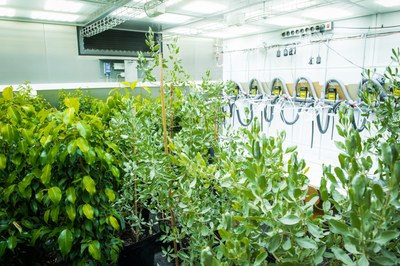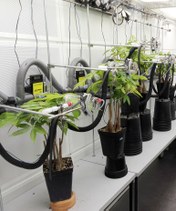Climate Change Ecology

Climate Change Ecology studies the impact of climate change on terrestrial ecosystems at local, regional and global scales. Both the meteorological and climatological causes of anthropogenic climate change and the impact on biogeochemical cycles are critically analyzed. Hands-on laboratory and field-based approaches are used to quantify stress-induced changes in plants and ecosystems. The aim is to gain in-depth knowledge on alterations of important ecosystem processes, such as carbon or water cycles. Finally, an introduction to earth system modeling approaches addresses these processes at larger scales.
In summary, this profile aims at developing a process-based understanding of climate change induced alterations in terrestrial ecosystems and potential adaptation strategies.
Important facts about this major
Language: English
Teaching form: on-campus
Pace of study: fulltime
Study location: Freiburg
Start: only in winter term
Duration: 4 Semester
Application periode: March 1st - May 15th
ECTS: 120 ECTS (80ECTS modules, 10 ECTS Internship, 30ECTS Thesis)
Costs: 190€ semester fees, 1.500€ study fees (only non-EU students!)

Focus
- Unique insights into large projects and facilities of climate change research
- Highlight: Excursion to Garmisch-Partenkirchen in the first semester
-
Experimental and self-designed scientific projects in small student groups
Program overview  pdf
pdf
Module details
1) Environmental Statistics
- Builds on and extends statistical knowledge and its application
- introductory module beyond multiple regression
- standard machine-learning approaches in R or Python
- Solve complex statistical tasks and advanced use of R
2) Lab-analysis of Climate Change Impact
- Impacts of environmental stress
- Basic methods of tree growth analysis, soil science and tree physiology
- Application of laboratory methods and critical data analysis
3) Ecosystem Functioning
- Background knowledge on important processes in ecosystems
- overview of ecological approaches and systems
- link to other profile tracks, and to their students
4) Land-Atmosphere Interaction
- Exchange processes of energy, water, and trace gases between biosphere and atmosphere.
- Micrometeorological methods of measuring and modelling land-atmosphere exchanges
- Attribution methods for land sources and sinks.
5) Climate Impact Research
- Overview on current approaches in climate change research
- Excursion to Garmisch-Partenkirchen
- Development of a research project proposal
6) Land Use Adaption
- Climate change and land-use change problems
- Applied work at authorities, NGOs and research institutions
- critical view on current land use strategies
7) Experimental Climate Stress Physiology
- Stress impacts on plants
- Design of greenhouse/climate chamber experiments
- Realization, analysis and interpretation of collected data
8) Methods in Ecosystem Research
- Field research at the ecosystem level
- Design, conductance and analysis of field experiments
- Written presentation of the results achieved
9) Environmental Monitoring, Data Analysis and Visualization
- Data collection and storage
- Data analysis and visualisation
- Upscaling of information
10) Earth System Modelling
- formulating processes as ODEs
- simulating (coupled) (partial) DEs using R/Python
- programming (modules of) a simple ecosystem model

Target Group
Students with a background in ecology, ecophysiology, and environmental sciences with an intrinsic motivation to understand and investigate the impact of climate change on terrestrial ecosystems, as well as the underlying processes and the role of the terrestrial biosphere in the global climate system
Career Opportunities

- Local and regional authorities in sustainability and environmental impacts
- Governmental and NGOs focused on mitigating climate change impacts
- Academic and research facilities
- Environmental education
Application and Requirements

Requirements
- BSc-Degree with grade point average of at least 2.5
- English C1
- 70 ECTS in natural sciences and ecology
- -> min. 25 ECTS in ecology
- 10 ECTS in Statistics and Geomatics
-> Basic knowledge in "R" is assumed!
Application periode: March 1st - May 15th
Application portal: HISinOne
further information: see "Application"
Coordinator & Contact


